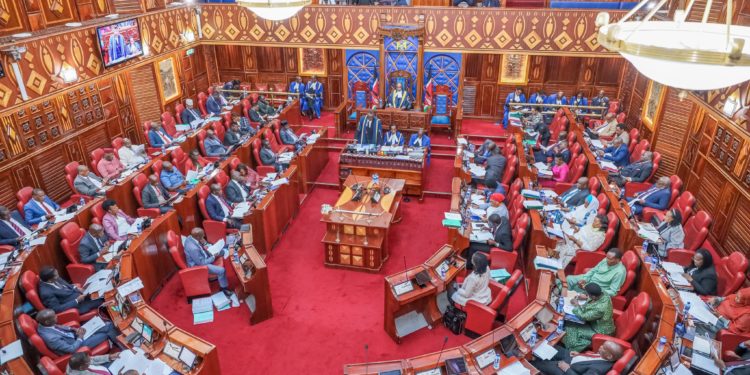Deputy President Rigathi Gachagua’s legal team endured a difficult day as the Senate dismissed several objections raised during his impeachment hearing on Wednesday. Led by Lawyer Ndegwa Njiru, Gachagua’s defense sought to challenge the legitimacy of key elements of the proceedings, but their pleas were rejected by Senate Speaker Amason Kingi.
In one of the first major rulings, Njiru objected to the appearance of Senior Counsel James Orengo, who was representing the National Assembly. Njiru argued that Orengo, as a full-time state officer, was legally barred from participating in such proceedings, claiming his involvement would be prejudicial to Gachagua.
“We are raising an objection to the appearance of Senior Counsel Orengo to represent the National Assembly. He is a full-time serving state officer and is legally barred from engaging in meaningful employment,” Njiru stated.
However, the National Assembly’s counsel, Eric Gumbo, countered this claim, noting that the Constitution does not prevent Orengo from representing the Assembly. “There has been no assertion that learned Senior Counsel James Orengo, by representing a party before this House, has participated in gainful employment,” Gumbo explained.
Speaker Kingi ruled in favor of the National Assembly, dismissing the objection and allowing Orengo to continue representing the Assembly.
The Deputy President’s defense team suffered another blow when they objected to the introduction of new evidence by the National Assembly. Njiru argued that the defense had not been served with the evidence beforehand, calling it a “trial by ambush.”
“Our response was exclusively limited to the documents we were served with. Mr. Speaker, these (new) documents will violate our rights to a fair hearing,” Njiru argued.
Yet, Kingi once again ruled against the Deputy President’s legal team, stating that the Senate’s rules allowed for the submission of additional evidence that buttressed already existing claims.
“It is my considered view that the affidavit and documents marked as volume 8A being referred, fall within the permissible of our rules of procedures. I, therefore, rule the objection dismissed,” Kingi ruled.
Gachagua, who has pleaded not guilty to all charges, faces accusations of gross violations of the Constitution, undermining the authority of the President, and compromising the functioning of the government. The charges also include inflaming ethnic tensions, misconduct, and engaging in financial improprieties.
The National Assembly has accused Gachagua of breaching several key constitutional articles, particularly those relating to the integrity of public office, devolution, and the judiciary. His remarks in 2023 regarding government projects being distributed based on ethnic voting patterns have been cited as evidence of incitement to ethnic division.
Despite the legal setbacks, Gachagua’s team continues to mount a defense against these serious charges, which if proven, could result in his removal from office.












